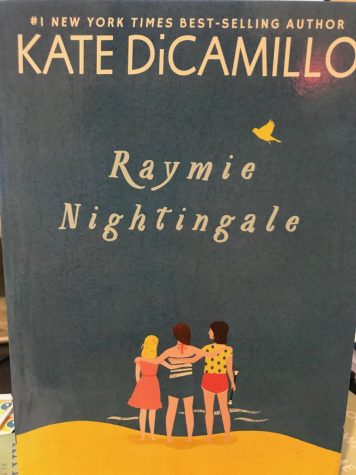Louisiana’s Way Home: Yet Another Example of Kate DiCamillo’s Mastery in Literature
“I will begin at the beginning.”
Although taken directly from the first page of Kate DiCamillo’s newest, highly anticipated novel, Louisiana’s Way Home, this statement is, in certain aspects, not entirely true. While the plot does focus primarily on Louisiana Elefante’s personal travels with her vivacious grandmother, Louisiana was actually introduced in one of DiCamillo’s previous novels, Raymie Nightingale, in which she served as one the main supporting characters. Through Raymie Nightingale, readers were able to glimpse the vibrant, rather quirky nature that is Louisiana — however, with the publication of this new novel, DiCamillo offers readers a chance to completely immerse themselves in the mind of this beloved character.
If I’m going to be honest, Kate DiCamillo and I did not get off to a particularly fantastic start. I was first introduced to her works in the second grade, a period in my life where I would have much preferred to indulge myself in the latest Geronimo Stilton installment. Therefore, a simple story revolving around a girl and her rather unattractive dog did not exactly come off as appealing. Ironically enough, it wasn’t until my early teenage years where I truly began to appreciate her novels for what they were: incredible jewels of literature that not only presented memorable characters but also lessons worth considering. In a matter of days, I’d read all of DiCamillo’s novels — Flora & Ulysses: The Illuminated Adventures being my favorite, with The Miraculous Journey of Edward Tulane coming in a close second. Even then, the remainder of DiCamillo’s novels maintained respectable positions in my list of favorite books, and, therefore, with the announcement of the publication of Louisiana’s Way Home to be set in October 2018, I was stoked. Fortunately enough for me, I wasn’t disappointed.
Louisiana Elefante has what most would consider a rather eventful childhood — the daughter of the famous trapeze artists, The Flying Elefantes, who perished on a ship before she was old enough to remember them, she was raised by her unpredictable grandmother who insisted they both had a ‘curse of sundering’ upon their heads. Due to this curse, Louisiana and her grandmother were fated entirely to dismal futures that consisted nothing but separation from those they loved, which resulted in their constant moving between different locations. The premise of Louisiana’s Way Home begins at such a departure — however, perhaps the most painful one, as Louisiana was forced to abandon her two best friends, Raymie and Beverly (introduced in Raymie Nightingale). At one point, Louisiana and her grandmother find themselves situated in a small town in Georgia, in which they meet a fascinating array of characters, including, but not limited to, a minister that resembles a walrus, a caring lady who bakes marvelous cakes for an annual contest, and a friendly boy with a crow on his shoulder. Here, Louisiana is forced to confront a number of truths regarding her history, and the painful emotions that accompany this, as she struggles to learn what it means hope, forgive, and find her way home.
Admittingly, Louisiana’s Way Home didn’t exactly top DiCamillo’s previous novels. While it presented an intriguing premise, the novel was rather dry in certain areas, and there were parts where I found myself skimming the novel simply for the purpose of finishing it. In comparison to Flora & Ulysses or The Tale of Despereaux, there wasn’t as much at stake to keep me motivated until the end.

However, that being said, Louisiana’s Way Home proved enjoyable in one specific aspect: It revived Kate DiCamillo’s distinguishable ability to foster interesting yet meaningful characters that readers have no choice but to fall for. As many of her readers would acknowledge, DiCamillo is no stranger to implementing bizarre characters that one wouldn’t find in the real world, whether that be acknowledging the superhero squirrel in Flora & Ulysses, or the mouse in shining armor in The Tale of Despereaux. However, DiCamillo makes up for this through her uncanny ability to fabricate characters that simply feel genuine. While their characteristics might not reflect those of our world, their honesty does, especially their susceptibility to human emotion. This proved especially evident in Louisiana’s Way Home, as Louisiana struggled to comprehend devastating betrayals at the same time she was adjusting to an entirely new community. However, her sincere desperation to discover a place to call home is definitely not a foreign emotion, and, her success in finding one (spoiler: there’s a happy ending) speaks volumes in melting reader’s hearts.
Ultimately, Louisiana’s Way Home once again proved DiCamillo’s unsurpassed ability to produce endearing characters that successfully connect with readers. In regards to whether one should read Raymie Nightingale before picking up Louisiana’s Way Home, I definitely would recommend following such a path, only because the latter does make a number of references to the former. Raymie Nightingale offers immense background to this exquisite character, and it would certainly be worthwhile to take the time to familiarize yourself before delving into her bittersweet world. And, if that doesn’t convince you enough, I’d personally recommend Raymie Nightingale simply to witness another of DiCamillo’s amazing works. DiCamillo is undoubtedly one of the most magnificent writers of her time, and indulging in any of her novels are hours well-spent.
Your donation will support the student journalists of Dublin High School. Your contribution will allow us to purchase equipment and cover our annual website hosting costs.

Danielle Tran is a senior at Dublin High and one of this year’s Editors-in-Chief. She holds a deeply-rooted passion for writing, and has dreamt of becoming...









![[Book Review] Weapons of Math Destruction: The insidious danger of Big Data](https://thedublinshield.com/wp-content/uploads/2024/06/wmdsarticle-727x1200.jpg)

























